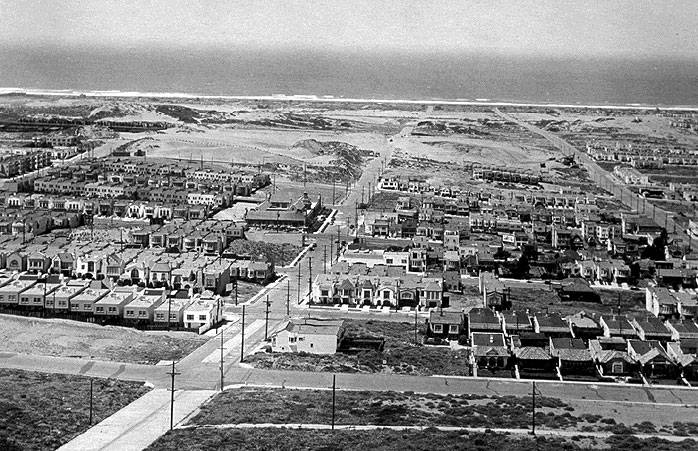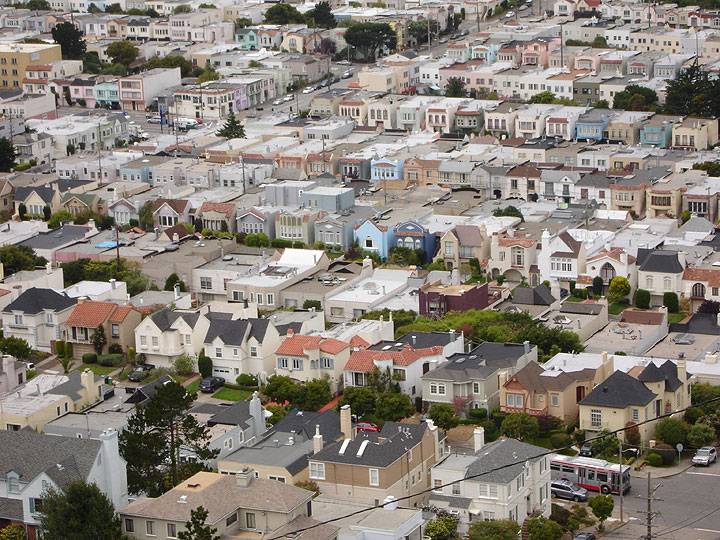Sunset Houses: Difference between revisions
No edit summary |
(added photo) |
||
| (10 intermediate revisions by 4 users not shown) | |||
| Line 1: | Line 1: | ||
'''<font face = arial light> <font color = maroon> <font size = 3>Unfinished History</font></font> </font>''' | |||
[[Image:Sunset dunes 1947.jpg]] | |||
'''Sunset houses start to fill dunes in 1936. The large building in the center of the photo is the old Infant Shelter, later the Conservatory of Music, and now a French school at 19th and Ortega.''' | |||
''Photo: Private Collection, San Francisco, CA'' | |||
[[Image:Sunset-view-north-from-reservoir 2253.jpg]] | |||
'''View north from reservoir in middle of neighborhood.''' | |||
''Photo: Chris Carlsson'' | |||
[[Image:sunset$sunset-homes.jpg]] | [[Image:sunset$sunset-homes.jpg]] | ||
''' | '''A more recent photo showing the development of the Sunset.''' | ||
''Photo: Chris Carlsson'' | |||
[[Image:Sunset-houses4289.jpg]] | |||
'''''' | '''Sunset houses from Golden Gate Heights, c. 2010.''' | ||
''Photo: Chris Carlsson'' | |||
The sand dunes that covered the Sunset District were finally covered over during the post-WWII construction boom. The mass produced homes and their cement front yards have since become the object of considerable derision among residents of the older parts of San Francisco, but remain a relative bargain for working and middle-class individual housing. On the infrequent clear days, when the fog lifts, a spectacular view of the Pacific Ocean is one of the secret benefits of living in the Sunset. | |||
[[Image:Sunset homes1.jpg]] [[Image:Sunset houses 2.jpg]] | |||
''Photos: Chris Carlsson'' | |||
[http://www.outsidelands.org/sunset.php Outside Lands Sunset Histories] | |||
[[Changing Physical Landscape of the Sunset |Prev. Document]] [[Sunset NW 1930 |Next Document]] | |||
[[Sunset | [[category:Sunset]] [[category:1990s]] [[category:1940s]] [[category:2010s]] [[category:Architecture]] [[category:buildings]][[category:Ecology]] | ||
Latest revision as of 21:03, 10 September 2020
Unfinished History
Sunset houses start to fill dunes in 1936. The large building in the center of the photo is the old Infant Shelter, later the Conservatory of Music, and now a French school at 19th and Ortega.
Photo: Private Collection, San Francisco, CA
View north from reservoir in middle of neighborhood.
Photo: Chris Carlsson
A more recent photo showing the development of the Sunset.
Photo: Chris Carlsson
Sunset houses from Golden Gate Heights, c. 2010.
Photo: Chris Carlsson
The sand dunes that covered the Sunset District were finally covered over during the post-WWII construction boom. The mass produced homes and their cement front yards have since become the object of considerable derision among residents of the older parts of San Francisco, but remain a relative bargain for working and middle-class individual housing. On the infrequent clear days, when the fog lifts, a spectacular view of the Pacific Ocean is one of the secret benefits of living in the Sunset.
Photos: Chris Carlsson






